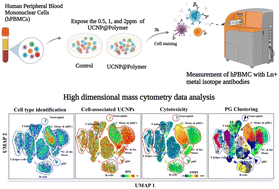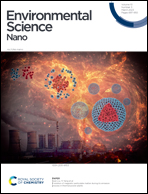A single-cell based mass cytometry study on heterogeneous interactions between upconversion nanoparticles and human immune cells†
Abstract
To encourage the use of lanthanide-doped upconversion nanoparticles (UCNPs) in a wide range of biomedical applications, it is necessary to perform comprehensive assessments of their toxicity. In particular, the cellular association and their heterogeneous interactions with human immune cells must be clarified prior to their use as a diagnostic or therapeutic tool in biomedical applications. Recent advancements of high-throughput single-cell technologies enabled us to characterize the complex interactions between nanoparticles and human immune cells and allowed us to gain a better understanding of their heterogeneous nature. In this study, using a single-cell based mass cytometry technique, we investigated the heterogeneous interactions of Yb3+/Er3+-doped NaYF4 UCNPs with human peripheral blood mononuclear cells (hPBMCs). Based on the manual gating strategy applied to the signals of 14 metal isotope labelled surface markers, twelve immune cell types, such as classical/intermediate/non-classical monocytes, naïve/memory B cells, plasmacytoid/myeloid dendritic cells, naïve/memory T helper and T killer cells, and neutrophils were identified from hPBMCs. The relative levels of cell-associated UCNPs and cell death were estimated based on the measurements of 89Y intensity and cisplatin uptake, respectively. Among various immune cell types, the phagocytic cells, such as monocytes and dendritic cells, displayed greater affinity to the UCNPs than the other non-phagocytic cells. Additionally, we utilized automated and unsupervised clustering algorithm, such as phenograph (PG), to profile additional subsets of these phagocytic cells, such as PG#1, 4, 18 of the classical monocytes and PG#2, 3, 19, 27 of the myeloid dendritic cells. This single-cell based mass cytometry study on UCNPs and hPBMCs demonstrated a new innovative approach to understand heterogeneous interactions of conventional nanomaterials with complex human immune systems, which will facilitate the safe implementation of nanomaterials in biomedical applications.

- This article is part of the themed collection: Environmental Science: Nano Recent HOT Articles


 Please wait while we load your content...
Please wait while we load your content...